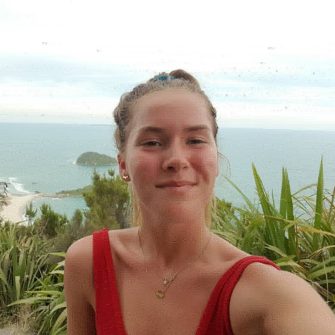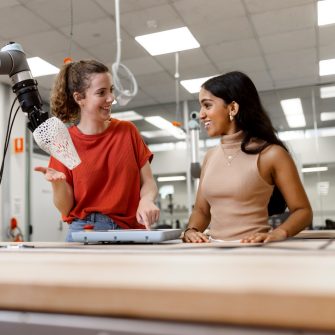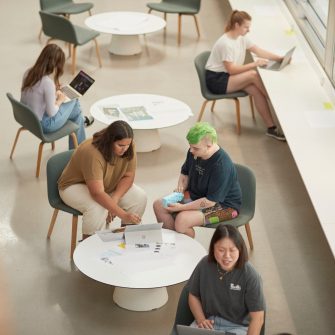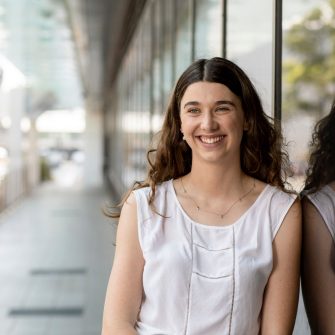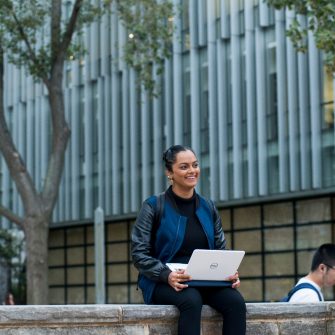Bachelor of Design / Media
- Commencing Terms
- Term 1, 2 & 3
- Duration
- 4 Year(s)
- Delivery Mode
- Face-to-face (includes blended)
- Campus
-
Kensington
- Codes
- UAC code 421051
- Program code 3342
- CRICOS code 110676G
-
ATAR/2025 lowest selection rank
- 80.0 View all admission criteria
-
2026 Indicative first year full fee
- $12,500*
-
2026 Indicative full fee to complete degree
- $52,500*
-
2026 Indicative first year full fee
- $47,500*
-
2026 Indicative full fee to complete degree
- $207,500*
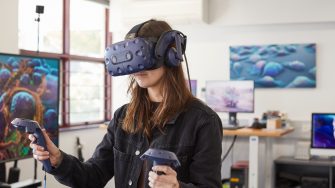
Application closures for 2026
International applications for all undergraduate programs, as well as postgraduate programs offered by the faculties of Arts, Design & Architecture, Engineering (excluding Master of Information Technology and associated programs) and Science are now closed to New Overseas Student Commencement (NOSC) for 2026 intakes.
Postgraduate programs offered by the Business School and the faculties of Law & Justice and Medicine & Health remain open. Master of Information Technology (and associated programs) also remain open.
- Overview
- Entry requirements
- What will I study?
- Future careers
- How to apply
- Fees & Scholarships
Overview
The Bachelor of Design/Bachelor of Media is a four-year double degree that shows you how to enlighten others with creative thinking and persuasive communications. Learn strategies to interest, inform, and inspire others while challenging conventions and designing new solutions to old problems.
Whether your interest is in graphics, textiles, visualisation or object design, creating spaces or user experiences, rethinking everyday products and services, or writing code to develop future focused design ideas – you'll see how design can influence the future.
Blend your creative insight with influential skills in public relations and advertising, communications and journalism, screen production, cinema studies, or media studies. You'll build real industry knowledge, learning from experts in practical and theoretical classes. And with solid opportunities for work experiences, you’ll unlock the expertise needed to establish a career far beyond your first job.
Key features
World-leading researchers and practitioners
Learn from teachers who are also world-leading researchers, breaking new ground in understanding how media work, from artificial intelligence to activism, to the politics of race and gender. Have your skills honed by experienced practitioners, many of whom still make films, grow brands, and write for leading publications. Glean deep insights from industry leaders who appear as guest speakers in the classroom.
Personalised skillset
Build a unique combination of skills in distinct specialisations that define your skills and interests. Choose from three design specialisations, and five media specialisations that include the freedom to explore topics outside your main study area. See ‘What will I study’ for more information.
Real work experience
What happens when you combine professional development, specialist facilities and industry-standard technologies with experienced, well-connected educators? Your career begins before you even graduate. This degree includes industry experiences such as internships, work placements, studio projects and industry networking opportunities.
World-class technologies
Bring your ideas to life in state-of-the-art facilities with support from our technicians. Discover the Design Futures Lab, The Making Centre, fully equipped creative workshops, and digital studios across our Kensington and Paddington campuses. You’ll also have an Adobe Creative Cloud subscription throughout your studies.
Why study at UNSW?
- State-of-the-art production facilities
- A diverse, creative, and inclusive community
- Access close ties to the media industry
- Connect with a global alumni network
Want to see more from UNSW Arts, Design & Architecture?
Entry requirements
-
- The 2025 Lowest Selection Rank (LSR) is the adjusted rank (ATAR plus adjustment factors) you would have needed to gain entry to this degree in 2025.
- The 2025 A levels score is based on four Advanced Level (A2) subjects. Entry scores are calculated from the best three or four A2 subjects (excluding repeated subjects) using the following values: A*=6, A=5, B=4, C=3, D=2, E=1. At most one Applied A Level subject may be included in the best four subjects used to calculate the aggregate.
- The 2025 IB Diploma is an indication of the IB you would have needed to gain entry to this degree in 2025. It is to be used as a guide only.
- The 2025 Lowest ATAR is the lowest ATAR (before adjustment factors were applied) to which an offer was made. Where <5 is listed, this indicates that less than 5 ATAR-based offers were made and so the score has not been published. N/A indicates no offers were made on the basis of ATAR.
*The Lowest ATAR to which an offer was made, for this program, is based on a UNSW Gateway Early Conditional Offer.
-
At UNSW, we are committed to ensuring prospective students have all the information they need in order to make informed decisions about their study options.
To assist you in gaining a better understanding of how Admissions works at UNSW, we have provided you with a summary of ATAR offers and the student profile.
We hope this information will help you identify the degree that is right for you.
Portfolio Entry
At UNSW ADA, you will find the freedom and support to design the future you want. An ADA Portfolio Entry submission will demonstrate your passions alongside your best work, to boost your chances of admission to a bachelor’s degree of your choice. For more information and to see specific guidelines for portfolio submissions visit UNSW Portfolio Entry.
Assumed knowledge
None
Adjustment Factors
We offer a range of adjustment factor schemes that reward students for academic performance and extra-curricular achievements. These schemes also take into account a range of personal and educational disadvantages that may have affected your studies.
HSC Plus
This scheme rewards students who perform well in Year 12 subjects that are relevant to their preferred UNSW degree. You may be awarded up to five points.
Elite Athletes, Performers and Leaders (EAPL)
This program recognises achievements in the areas of sport, academia, leadership and music at an elite level. You may be eligible for up to five points.
Educational Access Scheme (EAS)
Factors such as illness, financial hardship, language difficulties or attending a particular school can mean you don't always get the best possible marks in Years 11 and 12. If one of these situations applies to you, submit an application for the Educational Access Scheme (EAS) via UAC. Eligible students can receive between 1 and 10 points towards their chosen UNSW degree.
Admission pathways
Your ATAR is not the only measure of your potential to succeed, which is why we offer a range of pathways into university. Explore your options below and get in touch with our Future Student Advisers to discuss your path to UNSW.
Gateway Admission Pathway
This scheme is open to students who attend Gateway schools, live in a low-socioeconomic area based on IRSAD and IEO indexes of SEIFA criteria, or are an Aboriginal and Torres Strait Islander person. It adjusts the ATAR requirements for your preferred UNSW degree and provides early offers and early conditional offers to UNSW.
Entry programs for Australian Aboriginal and Torres Strait Islander people
We offer entry programs for Indigenous Australians, including the Indigenous Preparatory Programs and the Indigenous Admission Scheme (IAS). The entry pathway program you apply for will depend on the degree you want to study.
University Preparation Program
If you want to study at UNSW but faced challenges in year 11 and 12 that make you eligible for the UNSW ACCESS Scheme, but you don't meet the cut-off for degree entry, consider the University Preparation Program.
The University Preparation Program is a one-year pathway to a UNSW degree place. You'll study subjects that allow you to develop your academic skills, including maths skills if needed, so that you can achieve your best results. You also study degree level courses from week one, to give you a realistic introduction to university level study. If you do well in these courses you can earn course credit towards your degree.
English language requirements
You may be asked to provide evidence of your English proficiency to study at UNSW depending on your educational background and citizenship. English language skills are vitally important for coping with lectures, tutorials, assignments and examinations - this is why UNSW requires a minimum English language competency for enrolment.
If you’re completing an Australian Year 12 qualification (e.g. NSW HSC or equivalent), you do not need to provide anything extra to prove your proficiency. Your qualification will be used as evidence of your English proficiency.
If you do need to provide evidence of your English proficiency, this will be indicated in your application. You can prove this by providing evidence that you meet one or more of the following criteria:
- English language tests and university English courses
- Prior study in the medium of English
- Other qualifications
If you need to improve your English skills before you start your degree, UNSW College’s Academic English Programs are for you. The programs are suitable for various English levels and help you prepare for university studies and life in Australia.
For more details, visit the English Language Requirements page.
International direct entry
Information for applicants with CBSE, HKDSE or Singapore A Levels Qualification
Calculating your CBSE Score:
Awarded by CBSE, average percentage marks across English or Hindi, and your best four remaining subjects. Where marks are given as a range, the mid-point for that range is used e.g. 75 to 80 = 77.5.
Calculating your HKDSE Score:
Entry requirements are based on the aggregate of the best 5 achieved category A subjects (category B and C subjects are not considered).
For subjects other than Citizenship and Social Development: level 5**=7 points, level 5*=6 points, level 5=5 points, level 4=4 points, level 3=3 points, level 2=2 points, level 1=1 point, Level U=0 point.
For subject Citizenship and Social Development: Attained=2 points, Unattained=0 point. Citizenship and Social Development will only be counted towards the aggregate if the 2 points awarded for Attained ranks among the student’s best five scoring subjects.
If Mathematics Compulsory Part and Extended Part (Module 1 or 2) are both presented, both scores can be counted.
Calculating your Singapore A Levels:
Due to significant changes to the GCE A-Level Curriculum and University Admissions Score (UAS) calculation effective 2026, UNSW assessment is currently under review.
Note: Entry requirements published on this page are correct as of the day of publication and may change without notice.
We do not accept secondary qualifications from this country. We may accept tertiary study results, please contact us for more information.
Please contact us for direct entry requirements.
Admission pathways
If you do not meet the requirements for direct entry into your chosen degree, you may be eligible for a pathway program with UNSW College. UNSW College provides alternative entry options using university-approved content so that you can start your UNSW journey with confidence.
English language requirements
You may be asked to provide evidence of your English proficiency to study at UNSW depending on whether you are from an English-speaking background or non-English speaking background. English language skills are vitally important for coping with lectures, tutorials, assignments and examinations - this is why UNSW requires a minimum English language competency for enrolment.
If English is not your first language, you’ll need to provide proof of your English proficiency before you can be given an offer to study at UNSW. You can do this by providing evidence that you meet one or more of the following criteria:
- English language tests and university English courses
- Prior study in the medium of English
- Other qualifications
If you need to improve your English skills before you start your degree, UNSW College’s Academic English Programs are for you. The programs are suitable for various English levels and help you prepare for university studies and life in Australia.
For more details, visit the English Language Requirements page.
Check the specific English language requirements for this program
What will I study?
UNSW is introducing a new academic calendar from 2028.
We are moving to a new flex-semester calendar. What does this mean for your studies?
Study areas
Combine your interests for a unique career connected to your talents and passions. In a double degree, you focus on two areas of expertise to graduate with more knowledge, skills, and career options. Despite the name, it's not double the workload. A double degree combines the core courses from two programs. You'll graduate with two certificates sooner than studying two consecutive degrees.
Choose one specialisation each from design and media. The media specialisation includes opportunities to explore compelling aspects of the other specialisations through elective courses. See ‘Program structure’ for more information.
-
Designers place people at the heart of their work. Understanding how a person might interact with an innovative app, hold a ceramic mug, or experience an exhibit takes a combination of skills drawn from different methodologies. Designers integrate different creative skillsets and critical thinking to produce insightful solutions.
To meet NESA accreditation as a visual arts teacher, you’ll study graphic design along with your choice of either object design, experience design, interaction (UX) design, or 3D visualisation.
-
Integrated designers place people at the heart of their work. Drawing from diverse design skills and methods, integrated designers engage with a range of materials, encounters and ways of communicating. Integrated designers create insightful solutions using critical thinking, research, making skills and an awareness of industry needs.
-
The Integrated Design specialisation strongly focuses on solutions that respect human diversity and environmental sustainability while building skills in multiple areas of design. You'll choose at least two of these areas from graphic design, object design, textiles, fashion, experience, interaction (UX), and 3D visualisation.
We'll introduce you to this range of design disciplines, starting with the fundamentals. Working in state-of-the-art studios, you'll build core skills grounded in deep reflection on diverse historical, social, cultural and technological values.
Develop knowledge and skills while discovering how design can change society through professional practice. Take advantage of our strong industry connections to grow your professional network and employability with internship opportunities here and overseas.
The combination of skills and theory with real-world projects and industry experiences will prepare you for a career beyond your first job.
Start by choosing two design study areas outlined below, then decide which program structure suits your goals. (See 'Program structure' for more information.)
See examples of graduate work by integrated designers on the A&D Annual website.
-
Graphic design uses the skills of typography, image making, colour and design systems to develop effective and inspiring visual communications. Apply creative thinking to brand identities, innovative packaging, visually striking publications, and graphic design in 3D spaces. You’ll develop strong portfolio projects that demonstrate your voice as an emerging designer.
-
Object design works with different materials to create tangible and meaningful items – including but not limited to jewellery, furniture and ceramic design.
Fundamental hands-on classes explore materials before moving on to digital prototypes with 3D printing and cast designs. You’ll also understand different contexts and discover how object design gives people opportunities for social and meaningful interactions.
-
Textiles tell stories and solve problems, whether applied to fashion, interior, exterior or product contexts. In this highly experimental program, you'll explore creative approaches to making meaningful materials. Journey through hands-on textile making traditions and contemporary technologies to develop your own innovative practice. You will gain knowledge in sustainability and social engagement to analyse contemporary issues, and learn how to respond to professional design briefs responsibly, ethically and with cultural acknowledgement.
-
Experience designers transform spaces for people. They design memorable and meaningful environments with the intention of creating connection. Be it social connection or the connection of audiences to content, experience designers draw on human centred design principles to develop unique spatial outcomes, understand and integrate digital technologies and craft atmospheres that move people. With application across a wide range of industries, the design of activations, exhibitions and events relies on critical engagement with cultural contexts, neuroscience, materials and modelling, with a sprinkling of spectacle.
In this program, you'll experiment with a diverse range of design methods that contribute to a practice that ideates and creates evocative environments that surprise, delight and, ultimately, engage participants.
-
Explore fascinating emerging smart technologies – think voice assistants, robots, and mixed reality (for example, animated Instagram or Snapchat filters). Using these emerging technologies, you'll create a project demonstrating your understanding of human capabilities and user needs. But not before learning User Experience (UX) fundamentals in web and mobile.
Gain industry standard skills to meet people's needs with designing apps, software, products, websites, environments, and services. You'll develop practical and professional design processes through case studies and projects from concept to testing.
-
Discover the world of 3D technologies including real-time (or gaming) systems and virtual environments. Understand how to create objects and environments before creating a sophisticated and explorable 3D world. Learn through live, hands-on experiences of key technologies and understand how to conceptualise through design thinking. Build the theoretical knowledge for high-level art direction while developing professional skills in 3D modelling, CGI lighting and rendering.
-
In fashion design you will experiment with creative ideas to develop innovative garments. Throughout the program you will gain theoretical and practical skills in the fashion creation process from design to finished prototype.
You'll be encouraged to challenge fashion’s aesthetics, materials, and production processes to develop novel solutions for specific fashion markets. As you gain an understanding of sustainability and the circular economy, you will be supported to develop a strong responsible and ethical voice in your fashion practice.
-
-
Influence lifestyles by designing the daily products, systems, and services people use. Prepare for an industrial design career with experience and confidence. You'll be able to turn innovative thinking into strategic solutions that are functional, fulfill a genuine market demand or societal need, and are emotionally engaging and desirable.
Experience practical studio classes and theoretical courses in manufacturing, materials, sustainability, user empathy, and design research. You'll learn how to enhance human and environmental wellbeing and generate insightful, life-centered product ideas.
Through our strong industry links, you'll explore and test real-world scenarios and develop meaningful partnerships with leaders in the field. Become a competitive, versatile, and job-ready industrial designer with a clear ability to see complex problems as opportunities for impressive designs.
Learn more about Industrial design at the IDES Graduate Exhibition website.
-
This specialisation takes a different approach – resolving design challenges with cutting-edge technologies. Using various computer languages, you’ll encode decisions and test ideas spanning architecture, design, computer science and engineering.
Learning in studio-based classes, you’ll develop unique and in-demand skills, including 3D modelling, digital geometry, parametric design, responsive environments, and form-making. Become familiar with robotic and digital fabrication using 3D printers and laser cutters or Augmented Reality (AR) / Virtual Reality (VR) headsets to design for the metaverse.
Bring your designs to life through problem-solving, theoretical knowledge and practical techniques combined with creative and critical thinking. While you tackle challenges with design thinking and innovative technologies, you’ll be preparing for a career designing future solutions in the built environment.
Explore diverse aspects of computational design alongside creative and built environment students, staff and industry professionals. You’ll work to solve real-world problems, graduating with a professional portfolio and industry connections to launch your career.
Learn more about Computational design at the Code Conference website.
-
Program structure
The Bachelor of Design / Media consists of 32 individual courses, which are 16 core courses from each single degree. As a full-time student, you’ll typically study eight courses a year. You can study part-time, and also take advantage of a flexible study load. For detailed information on the full program structure, visit the handbook.
-
-
Whether you want to study more or fewer courses in any term, the choice is yours. Our flexible academic calendar means you can graduate faster or take your time to study abroad, complete an additional internship, or fit your study around other commitments.
-
Broaden your horizons and study overseas for a term. Choose an international exchange at one of UNSW’s 300 partners in more than 30 countries. UNSW encourages a global mindset, which means overseas study can be credited toward your degree with us, and you may also be eligible for financial support to help cover the costs of studying internationally.
-
Whether you have a learning difficulty or could benefit from extra guidance, you’ll also find free UNSW academic skills support (such as toolkits, tutors, and workshops) to assist your studies. UNSW Arts, Design and Architecture students and academics are supportive, diverse, and inclusive – it’s easy to ask for advice.
-
Future careers
More than just a foot in the door or a pathway towards landing your first job, this degree will set you up with the professional and creative skills you’ll need to thrive throughout your career. Turn your time with us into a future that celebrates your passion and purpose.
-
- Advertising strategist
- Advertising account executive
- Communications officer
- Content producer
- Community engagement adviser
- Digital communications coordinator
- Government media adviser
- Journalist or feature writer
- Internal communications specialist
- Marketing executive
- Media account executive
- Media relations adviser
- Public relations consultant
- Social media manager
- Video presenter
-
- Animator
- App developer
- Advertising creative
- Cinematographer
- Digital editor
- Digital producer
- Filmmaker
- Game designer
- Interactive media designer
- Screenwriter
- Sound producer
- Television producer
- Video producer
- Website content manager
-
- Graphic designer, visual communicator, or illustrator
- Interaction and user experience (UX) designer
- Exhibition, experience, and event designer
- Jewellery, wearable, and textile designer
- Furniture, object, ceramics, or lighting designer
- Virtual reality 3D visualiser or digital media producer
- Design instructor or design strategist
- Film, television or mobile producer
- Packaging designer
- Colours, materials and finishes (CMF) designer
- Consumer electronics, home appliance or medical device designer
- Automotive designer
-
- Architectural and urban design specialist
- Software solutions developer
- Smart cities consultant
- Urban data analyst
- Design technology manager
- Digital fabrication and smart-manufacturing specialist
- Gaming environment developer
- Building information model implementer
-
- Consumer product designer
- Design strategist
- Digital multimedia design
- Furniture designer
- Packaging designer
- Product branding and marketing
- Product design consultant
- Not-for-profit product designer
- Retail industry product designer
- Transport industry product designer
- Service designer
- Scientific industry product designer
Explore your career options
Many career options lie ahead in your future. If you don’t know what you want to do yet, it’s ok. University is the time to test your ideas, discover potential career paths, or develop the knowledge to create a job that doesn’t even exist yet.
Degrees from UNSW Arts, Design & Architecture include opportunities to experiment with professional roles in internships and work placements. You’ll build contacts among your classmates and lecturers, and you’ll be able to reach out to a global network of UNSW graduates.
Completing the Bachelor of Design/Media program gave me full confidence in entering my desired industry. I felt it was such an engaging and well-rounded program that ensures curious students can walk away with a diverse array of creative skills, regardless of prior knowledge of design or media!
How to apply
Applications for undergraduate study from domestic students (Australian citizens, Australian permanent residents, Australian permanent humanitarian visa holders and New Zealand citizens) are processed by the Universities Admissions Centre (UAC).
Visit the Apply section of the UAC website and you can nominate up to five degrees in order of preference, with the first being your most desired degree and university.
On-time applications for admission usually close at the end of September each year for Term 1 admission. Late applications can be submitted, but a late fee will apply. For study starting in Term 1, the majority of offers are made in December and January. Visit the UAC website for key dates for admission outside of Term 1.
Ready to start your application?
For most international students, applications are submitted via our Apply Online service. We encourage you to submit your completed application as early as possible to ensure it will be processed in time for your preferred term.
Some high-demand programs with limited places, may have an earlier application deadline or may have an earlier commencement date. For details, visit the international admissions information page.
*If you are an international student studying an Australian qualification, go to the Universities Admission Centre (UAC) for application and UAC key dates. Note: If you are under 18 years of age, you need to make special arrangements. For details, visit the under 18 international students page.
Ready to start your application?
Fees & Scholarships
Commonwealth Supported Place: Student Contribution Band 4
*The student contribution for a Commonwealth Supported Place is an indication only of the amount payable in Year 1 based on a standard full-time load of 48 credit points (1.0 EFTSL). The actual student contribution you will be liable for depends on your individual program of study and the calendar year in which you enrol. Actual fees are calculated upon enrolment. Student contribution amounts are subject to annual review by the university and may increase each year during your studies (subject to caps determined by the Australian Government), effective at the start of each calendar year.
The indicative fees listed here are based on an estimated average and are for tuition only - other fees and charges are not included.
*Fees are subject to annual review by the University and may increase annually, with the new fees effective from the start of each calendar year. The indicative fees listed here are based on an estimated average and are for tuition only, other fees and charges are not included. The amount you pay will vary depending on the calendar year to enrol, the courses you select and whether your study load is more or less than 1 Equivalent Full Time Student Load (8 courses per year).
Indicative fees are a guide for comparison only based on current conditions and available data. You should not rely on indicative fees. More information on fees can be found at the UNSW fees website.
Indicative fees to complete the program have been calculated based on a percentage increase for every year of the program. Fee increases are assessed annually and may exceed the indicative figures listed here.
Indicative fees to complete the program include tuition plus an estimate of study-related costs of approximately $1,000 per year. To find out more about other costs, visit UNSW International.
Scholarships
At UNSW, we award over $83 million in scholarships each year. We pride ourselves on rewarding excellence and making university accessible to students from all walks of life. Whether you’re a domestic or international student, our range of scholarships, prizes and awards can support your journey.
Progress starts here – at a world-leading university

Top 20 Worldwide
UNSW is ranked #20 university in the world
QS World University Rankings, 2024–2026

Most Employable Graduates
Winner of the AFR Most Employable University Award seven years in a row
AFR Top100 Future Leaders Awards, 2020–2026

Australia's #1 for Innovation
Highest number of startups and spinouts from university-developed tech
SCOPR report, 2024

